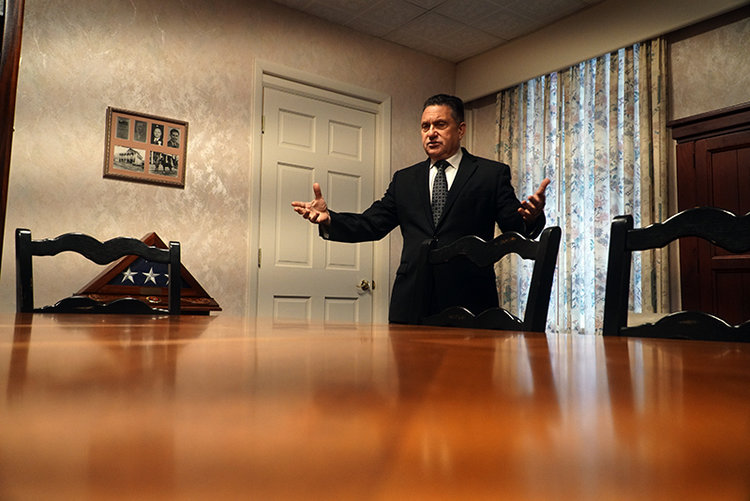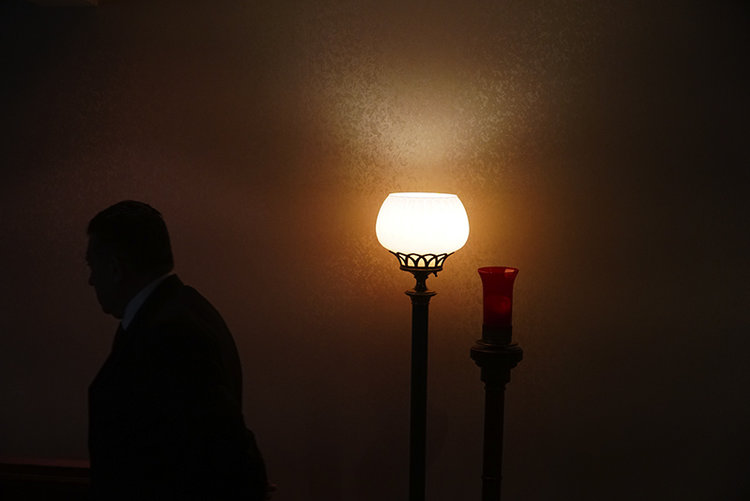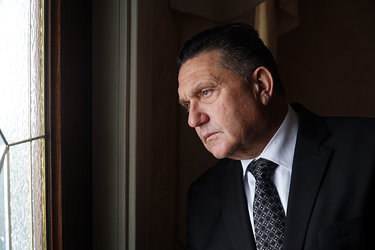Funerals in the time of coronavirus: no church services, no hugging, and remote arrangements
ALTAMONT — Imagine a funeral where mourners can’t hug each other.
That is the reality now in New York State as directives to prevent the spread of coronavirus touch all parts of life — and death.
“We’re trying to learn to deal with people from a distance,” said John Gulino, who has been a funeral director for 36 years.
He owns Fredendall Funeral Home in Altamont and has another funeral home in Windham in Greene County.
While funeral homes provide “essential services,” according to Governor Andrew Cuomo’s executive order to “pause” New York, which shut down all non-essential businesses, funeral homes now have guidelines to follow.
“The work of cemeteries is considered an essential business,” said Gulino. “The graves will be dug; people will be buried. It’s not going to get like Italy; we’re not going to let that happen.”
As the death toll from the coronavirus in Italy approaches 5,000, morgues are inundated, and coffins pile up in the churches of local cemeteries.
“That’s crazy in Italy,” said Gulino.
As far as New York’s guidelines are concerned, he said, “We can’t have any big gatherings. We can make it family-only and curtail the hugging. They can’t do that right now.”

Gatherings for funerals in New York State are now limited to no more than 50-percent of the maximum capacity of the funeral home or 50 individuals, whichever is lower.
Gulino went on, talking of the past, as recently as two weeks ago, “We’ve had wakes with 200 people,” he said. Often, there are 30 or 50 mourners, he said. “It depends on how big the family is and how active the person was in the community,” he said.
But now, he wouldn’t have more than 10 people in his funeral home, Gulino said. “With a public viewing, you never know who is walking through the front door.”
Gulino has been following emails and posts from the New York State Funeral Directors Association.
After the governor’s executive order on Friday, March 20, banning gatherings, funeral directors were told there could be no funeral gatherings or viewings; while the essential work of burials and cremation would continue, funerals would have to be held later, after restrictions were lifted.
“Then that changed to direct burial with family,” said Gulino on Monday. “Then it went back to viewing but a minimal amount.”
The latest executive order went into effect on Sunday, March 22, at 8 p.m.
“A colleague yesterday had 28 people set up in a room for social distancing. There are no church services now,” Gulino said on Monday. “We could have just a family-only wake. I, personally, wouldn’t do more than 10 people in one spot.”

The long view
As a funeral director, Gulino has weathered several crises. He started his career, in New York City, in the midst of the AIDs epidemic.
In 2001, his funeral home in Windham handled the funeral for one of the passengers on United Airlines Flight 93 that was hijacked by al-Qaeda terrorists as part of the Sept. 11 attacks.
In 2011, when Tropical Storm Irene devastated the area, Gulino said, “I lost my funeral home in the flood.” He had 12 feet of water in his Windham building and the parking lot collapsed, he said.
His building was closed for two-and-a-half months while massive repairs were underway. He used the town’s Catholic church, Protestant church, and Masonic Hall for viewings, he said.
“I’ve seen lots of times where the community does latch together,” said Gulino. “You have to support the community. I want the community to be OK.”
With the current coronavirus pandemic, Gulino said, “Personally, I feel we should shut down everything.”
Gulino on Monday afternoon was watching his grandchildren whose school, like those across the state, was closed. Both of their parents work in jobs considered essential under the governor’s executive order shutting down most businesses. Gulion’s daughter is a mail carrier and her husband works in transportation for CSX.
If everything were shut down, Gulino reasoned, his grandchildren would be home with their parents.
Recent deaths
With the three deaths that he handled last week, Gulino said, the bodies were all cremated. “The families decided to wait for a public service later,” he said.
It would be possible for him to store some bodies, Gulino said, in the Guilderland Cemetery vault.
“It has a capacity for 10 caskets,” he said.
The cemetery is located at Osborne and Stitt roads in Guilderland Center and has been owned by the town of Guilderland since 2002, when its association was no longer able to maintain it.
Gulino uses the Guilderland Cemetery vault for winter storage. He applies for a permit from the town of Guilderland to use the vault as do other funeral homes.
“We have one in there now from the winter time. We were planning an April 15 burial,” he said, surmising that the family now will wait.
Gulino said further that he is allowed, by law, to store bodies at his funeral home.
The families he has dealt with in the last week or two, who have to choose between having a small ceremony now or waiting until restrictions are lifted to have a ceremony later, have been understanding, said Gulino. “They feel it’s unfortunate.”
He went on, “I told them my feelings,” he said, urging them to wait. “Both Altamont families had elderly people that would be in attendance,” he said.
He’s especially aware of the vulnerabilities, Gulino said, because his father is 89. His father lives in Florida and Gulino had wanted to bring him to his home in Windham but decided it is “not a good time to travel.”
Handling the body of a COVID-19 victim
Gulino also works as a Greene County coroner. “I still have to respond to unattended deaths, he said. “I’m as cautious as I can be.”
He went on, “They say it’s not spreadable from the deceased but they aren’t sure of it.”
“I just started my career when the AIDs epidemic hit,” said Gulino. He was a young funeral director in the Bronx in the mid-1980s. “That was a scary time,” he said.
“I learned universal precaution. You treat every body as infected,” he said. “You put your safety first and foremost.”
So Gulino is not fazed by the guidelines from the state, which closely follow those issued by the Centers for Disease Control and Prevention. For example, in handling a decedent who died of COVID-19, when transporting a body that has been bagged, workers should disinfect the outside of the bag with an product approved by the Environmental Protection Agency expected to be effective against COVID-19, the guidelines say.
The state guidelines also say that, although there is currently no known risk associated with being in the same room with the body of someone who died from COVID-19, people should consider not touching the body. Additionally, individuals who were in close contact with the person who died may themselves be infected with the virus and should not attend funeral services as they may infect others.
Business
The new directives on funerals and viewings, Gulino says, are “bad for business.”
He noted that he has closely monitored his money in his last 36 years as a funeral director. “You never know when you’re going to be doing business,” he said.
But this is different.
“When someone uses the facility, we charge,” he said. Now revenue is not coming in for use of that space as there have been just immediate cremations.
“If people cremate Mom, there’s no need to embalm her,” Guliono said. “Now we don’t collect for that service.”
Also, people aren’t using ancillary services, like choosing memorial cards or ordering flowers, he said.
Remote arrangements
Formerly, Gulino met with families in a conference room to make funeral arrangements.
“Now I can Skype with people to make arrangements,” he said.
He has met with families face-to-face since the guidelines went into effect, he said, “But we stayed far enough away. We were spaced out in the lobby area rather than meeting in the conference room.”
If families do decide to have a service in the funeral home now, rather than waiting for the coronavirus restrictions to be lifted perhaps months from now, Gulino said, “We have WiFi here. I could video something here if that’s what they want.”
That way, although the number of mourners at the service in person would be small, the video could reach family and friends in their own homes.
Also, Gulino noted, much of the “paperwork” required to confirm a death and arrange a burial is done remotely.
“Signatures can be scanned,” he said. “You’re allowed to set up a cremation through scanned emailed documents.”
New York State uses an Electronic Death Reporting System, known as EDRS, as part of the state’s Health Commerce System, which is a secure online communication system operated by the state’s Department of Health.
“Funeral directors, the coroner’s office in each county, and the clerk’s office in each municipality are all connected,” said Gulino. “When it works, it’s great.”
But sometimes it doesn’t.
Last week, it didn’t work for one of the deaths Gulino was handling. A doctor has to sign the death certificate and then it has to be filed in the municipal office. The doctor couldn’t get it to work through the system, so she physically signed the death certificate, Gulino said.
So he drove to Bethlehem’s town hall with the paperwork and waited outside — the town hall was closed to the public because of coronavirus restrictions — for the clerk who took the paperwork at the front door and gave Gulino a signed permit. “She’ll mail me the paperwork,” he said.
The arc of change
In the same way that embalming became an accepted practice only because of the crisis caused by the Civil War — the bodies of fallen soldiers were embalmed to be transported home for burial — so, too, the current coronavirus crisis may crystallize changes to funerals in the United States.
“Over the last 10 to 15 years, people are moving away from each other,” said Gulino. He noted that families often used to live in the same area but now “kids move away,” he said.
“I do see a huge change in funeral trends. There is way less viewing,” said Gulino. “There is much more cremation and many more graveside immediate services,” he said. “There are a lot less wakes and people going to the funeral home. They gather at a later date for a celebration.”
Gulino went on, “Twenty years ago, it was important to have the body laid out and there was a church service. So many people have now walked away from the church. They used to have a minister or a priest.”
Now, there’s more of a do-it-yourself approach to mourning.
“I hate to say it, but it’s almost become an inconvenience when someone dies,” said Gulino. “We’ll cremate Mom now and meet on June 8 at Aunt Mary’s backyard to have a celebration of her life … without involving the church,” he said, characterizing some of the current thinking.
“People now have a funeral without the body present. We have memorial services here,” Gulino said of his Altamont funeral home, “with video tributes where the family members speak.”
Jewish families, he noted, still follow age-old traditions. “In the Jewish tradition, in a perfect world, they want things done in 24 hours but they do allow 48 hours with all the permits. Then the family sits shiva, almost like a wake in the house. … Then they have an immediate burial at the cemetery.”
With the current coronavirus crisis, Gulino said, “I look at this as Kübler-Ross does the five stages of death.”
In 1969, the Swiss-American psychiatrist Elisabeth Kübler-Ross published a book, “On Death and Dying,” based on her work with terminally ill patients in which she outlined five stages of emotions those patients went through before dying: denial, anger, bargaining, depression, and acceptance.
“You go through all these stages and then finally you accept it,” Gulino said of the coronavirus. “I’ve had a lot of anxiety over it. I was angry it happened. But now I’m in the acceptance stage.”
He concluded, “We’re going to learn new things and things may be better in society. Maybe we needed to be brought back to reality.”



